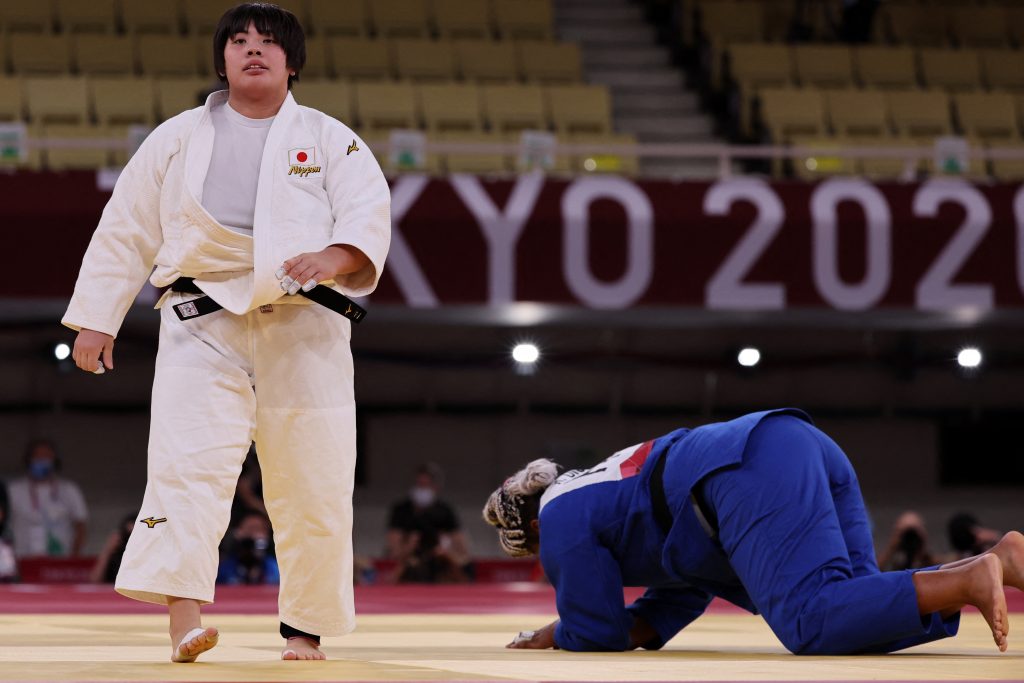
- ARAB NEWS
- 14 Jul 2025

TOKYO: Although these Olympics have been plagued by unprecedented challenges and many public setbacks for the host nation, they are already the most successful in Japan’s entire sporting history when measured from the top of the medal podium.
And the gold rush by Japan’s dominant judo team is the biggest reason there’s plenty to celebrate in Tokyo this weekend.
Japan’s 14 judo players put on the greatest collective performance in the Olympic history of their homegrown martial art during the eight-day tournament at the Budokan, claiming a record nine golds and 12 total medals from a possible 15 at the Budokan.
“Having this many gold medals is a great accomplishment for all of us,” gold medal winner Aaron Wolf said through a translator. “But all of us were trying, and not all of us succeeded. We will have motivation for the future.”
With judo leading the way, Japan has taken home 17 overall gold medals from the first eight days in Tokyo.
Japan won 16 golds at the first Tokyo Olympics in 1964 before matching that number in Athens in 2004, but the second Tokyo Games are already the home country’s most successful because its powerful judokas put a nation on their backs and carried it to success.
The judokas fell short of a 10th gold Saturday night when they lost in the final of the first Olympics mixed team competition, but the surprise ending did little to overshadow the overall achievement of this eight-day tournament.
“I was proud I was able to fight with my team,” two-time Olympic gold medalist Shohei Ono said. “I was able to observe my teammates’ judo today, and even though we didn’t win, once again I realized how strong we all are. I think this is a great team consisting of top-level judoka. I think this is something that will become something I’ll cherish for the rest of my judo career going forward.”
The Japanese team was under extraordinary pressure to perform in its home Games. Japan has won far more gold medals (48) and total medals (96) than any other nation in judo, which was introduced at the first Tokyo Olympics 57 years ago in the same venerable arena.
The judokas knew the nation was watching: The Japanese media reportedly constantly on their exploits, and while the nation’s planned public viewing parties had to be canceled, fans in the severely restricted city still found ways to congregate outside electronics stores or restaurants to catch glimpses of their judo heroes.
Japan also captured two silvers and a bronze, and those 12 total judo medals matched its record haul from Rio de Janeiro a half-decade ago.
No other team had ever won more than eight judo gold medals at an Olympics, and that was Japan in 2004. The results from judo’s return to the Budokan were unprecedented — even if the final day didn’t go ideally for the group labeled “the dream team” by the Yomiuri Shimbun newspaper.
Ono took his first loss since 2015 in the quarterfinals against Germany’s Igor Wandtke, and fellow gold medalist Uta Abe also took a surprising defeat before Japan rallied for eight straight wins to reach the final.
But France beat Japan in four of five bouts, leaving Ono on the sideline because he was slated to compete in the sixth. Tsukasa Yoshida’s narrow loss to Sarah Leonie Cysique sealed Japan’s final defeat, and France celebrated with the knowledge of the gravity of its achievement.
“To win here in the country of judo, during the Olympic Games in Tokyo, in the Budokan, it’s just amazing for me and this team and the people of France,” heavyweight Teddy Riner said. “To win the final over the Japanese team? Wooooooooooow.”
Afterward, the Japanese judokas accepted their medals with less overt enthusiasm than the other three teams on the final podium, yet they were all smiles while posing for photos and throwing their coaches into the air.
Judo is incredibly important in Japan, and these Olympics will only underline it. The martial art’s combination of fierce competition and respectful, deferential sportsmanship resonates deeply in the Japanese psyche, and the players in Tokyo were aware of every aspect of their responsibility.
The final day underlined the importance of the next three years before Paris, where the powerful French team will have the home-tatami advantage. All of the Japanese stars in Tokyo are young enough to compete in 2024, but the competition to make the Japanese team is even tougher than most international competitions.
“I’m not satisfied, but with these team members, we were able to compete to the end,” Wolf said. “So in that sense I feel some fulfilment, but I would still like to take on the challenge from losing today, and go for revenge at the next Olympics in Paris.”
AP News